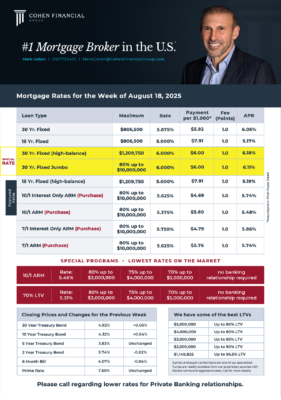Mortgage Rates Unchanged
Investors were focused on major inflation data last week. While the more significant CPI report matched expectations last Tuesday, the PPI inflation data last Thursday was much stronger than expected. The impact of the PPI report was minor, however, and mortgage rates ended last week nearly unchanged.
Inflation Sees Core CPI Rise
The Consumer Price Index (CPI) is one of the most closely watched inflation indicators released each month. Since it excludes food and energy prices, which are prone to short-term volatility, investors tend to focus on core CPI to get a clearer sense of the long-term inflation trend. In July, Core CPI rose 0.3% from June, matching the consensus forecast. It was 3.1% higher than a year ago, up from 2.9% last month and the highest annual rate since February.
Producer Price Index Surges
Another significant inflation indicator released last week, which measures costs for producers, came in far above the expected levels. The July core Producer Price Index (PPI) jumped a shocking 0.9% from June, while the consensus forecast called for an increase of just 0.3%. This was the largest monthly increase since June 2022. Core PPI was 3.7% higher than a year ago, up from an annual rate of 2.6% last month and the highest level since March. Both CPI and PPI remain well above the 2.0% target level of the Fed. Of the two major inflation reports, investors tend to place less weight on PPI, since it reflects a smaller slice of the economy than CPI. Going forward, investors will be watching closely to see if higher tariffs continue to exert upward pressure on inflation levels. Following the latest inflation data, investors now anticipate that the Fed will reduce the federal funds rate by 25 basis points at the next meeting in September and by another 25 basis points before the end of the year.
Retail Sales Show Solid Growth
Consumer spending accounts for over two-thirds of U.S. economic activity, so investors pay close attention to the monthly Retail Sales report as a key measure of the health of the economy. Retail sales in July rose 0.5% from June, matching the consensus forecast, and they were a solid 3.9% higher than a year ago. Particular strength was seen in motor vehicles, home furnishings, and apparel. While some investors have been concerned that consumers may scale back their spending due to economic uncertainty, it has not taken place so far this year.

Mortgage Rates for the week of 8-18-2025
